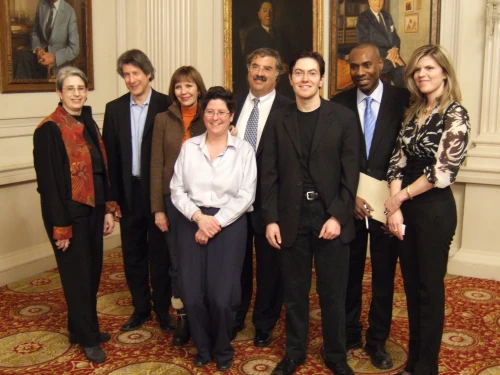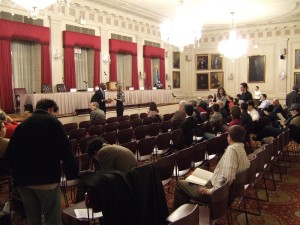On Tuesday, Feb. 3, 2009, the New York County Lawyers’ Association sponsored a public forum called “Protecting Journalists and Their Confidential Sources: A Matter of Privilege.” The event brought together lawyers and journalists, both on the panel and in the audience, to discuss the legal risks reporters face when dealing with sources that wish to remain anonymous. To get a basic understanding of what reporter’s privilege is, you can watch this video from Media Law Resource Center attorney Maherin Gangat.

L-R: Ann B. Lesk (NYCLA president), John Zucker, Judith Miller, Eve Burton, George Freeman, Joshua Kors, Carl Unegbu, Olivera Medenica (NYCHA Entertainment, Media, IP, Sport Law Section program chair)
Speakers:
Judith Miller, The Manhattan Institute (formerly of The New York Times)
Eve Burton, vice president and general counsel, The Hearst Corporation
George Freeman, assistant general counsel, The New York Times
Joshua Kors, investigative reporter, The Nation magazine
John Zucker, vice president, Law and Regulation, ABC, Inc.
Moderator:
Carl Unegbu, freelance journalist and NYCLA committee member
Sponsor: NYCLA’s Entertainment, Media, Intellectual Property and Sports Law Section
Co-Sponsors: NYCLA’s Civil Rights and Liberties Committee and Criminal Justice Section
———————————————-
8:15 p.m.: WRAP – The forum is over and people are milling around talking to each other. General consensus: this area of media law is still very unclear and there are disagreements about what is necessary in terms of privilege. But the room is filled with the buzz of conversation, so at the very least, the discussion is continuing; and with the introduction of a federal shield law in Congress next week, I’m sure that discussion will continue.
8:11 p.m.: A questioner in the back row with an extremely cutting (and loud) voice (I admire his projection abilities) asks about how the discussion of reporter’s privilege could relate to the idea of executive privilege. Burton, in her response, says that from a legal standpoint, both privileges relate to the broad power grab by the powers vested in Article II of the Constitution (the Executive Branch) in the last eight years.
8:06 p.m.: In response to a question about timeliness of this issue, Zucker brings up a current case of a Detroit Free Press reporter who will not divulge his sources.
8:00 p.m.: Miller says that if a source lies to you, then you don’t publish it. Some murmurs in the room. She then qualifies it by saying when they “knowingly lie” to you and whether or not you’re able to know that they did.
7:56 p.m.: The question of qualified promises to sources comes up – as in “I’ll give you confidentiality until I get in trouble with the law.” Miller and Kors agree that sources will dry up unless the promise is a full promise of confidentiality. The questioner wonders out loud, then, what’s the point of the federal shield law?
7:52 p.m.: The radiator to stage right, keeps moaning slightly, on and off. I wonder if it might get worse and become a real nuisance.

7:48 p.m.: In response to the first question asked, George Freeman speaks about differences in the versions of the law in Congress. The last Senate version of the shield law only protects reporters and sources when it comes to confidential sources. However, the last House version protected any communications between reporter and source, confidential or not.
7:45 p.m.: The moderator opens the floor for questions from the audience. First one goes to a criminal defense lawyer sitting in the front row.
7:41 p.m.: First mention of the new Obama Administration by:…. *drumroll* John Zucker. He hopes that the new administration won’t go after journalists the way the Bush Administration did.
7:40 p.m.: As journalists, we need to consider whether or not we are being mouthpieces for an anonymous source who wants to disseminate false info, Kors says. But, he continues, it’s our job to make sure the information is true.
7:36 p.m.: Federal Shield Law actually adds something to state laws with regard to a leak investigation.
7:30 p.m.: Eve Burton says that Sen. Dianne Feinstein is worried that terrorists will try to claim this privilege. Miller interrupts her and says twice, “she’s afraid of Al-Jazeera.” Burton thinks that the question of who qualifies as a journalist is really not as a big part of this issue as people make it out to be. She thinks there are other more interesting parts of the issue. But she doesn’t say what. I’d like to know what she’s thinking.
7:25 p.m.: Who qualifies as a journalist? It was like hot potato with this question – first directed to Kors, then passed to Miller, now to Freeman.
7:21 p.m.: Zucker ties his point into a little historical context. Nixon really wanted to go after the press in the late 1960s. Despite the Supreme Court Branzburg decision against the press, state courts in the ‘70s were generally supportive, but now the pendulum has swung against journalists.
7:18 p.m.: Zucker gets his first shot – he’s speaking about national security and a federal shield law. He makes a very good point that most information re: national security is classified. And since it would be illegal for anyone to give reporters this information, this is one area where we definitely need a federal shield law.
7:15 p.m.: Judith Miller would make the same decision (to not reveal that Scooter Libby was her anonymous source, and go to jail as a consequence) that she made a few years ago if she had to do it again.

AUDIO: Listen to Judith Miller after the forum talk about why she would make the same decision today
7:12 p.m.: We’re getting toward an hour into the forum and I’m starting to wonder if John Zucker is getting a little annoyed that he hasn’t been given an opportunity to speak yet. He’s all the way that the end of the panel. Literally and figuratively.
7:08 p.m.: First question from the moderator: Who is the privilege given to? Judith Miller thinks that “it is the source’s privilege.” Miller says that she never wrote anything with the information she had gotten from her confidential source (now known it was Scooter Libby). She wishes she had. After some of the discredited WMD reporting, I’m sure some in the audience were thinking they were glad she didn’t.
7:06 p.m.: Reporters are saying “it’s just not worth it” to publish stories when you have no protection. It stops the free flow of information.
7:04 p.m.: The purpose of the federal shield law is meant to “mesh” with the state shield laws. And it’s not an absolute privilege. It’s a balancing act. It’s the judge’s job to balance. What’s the interest of the government? Versus what’s the interest of the people?” says Eve Burton.
6:55 p.m.: The press are the government’s watchdogs, “not their lapdogs,” says George Freeman. He’s talking now about the Branzburg decision as precedent and talks about the three-part test.
6:52 p.m.: A Federal Shield Law will be introduced in Congress next week, says George Freeman. This privilege doesn’t only protect one person; it protects all of us. It enables all of us to get more information. If sources are afraid to talk to reporters, we’re just going to get news and information from the powerful in society. One could argue that this privilege is more important than a doctor-patient privilege.
VIDEO: Watch George Freeman after the forum talk about a federal shield law
6:46 p.m.: (How do you corroborate a confidential source? ) How do decide when to grant anonymity to a source? “First you have to question his motives,” Kors says.
6:40 p.m.: Joshua Kors sets up a presentation related to his reporting on veterans’ issues; it’s a Bob Woodruff package on ABC’s World News Tonight with Charlie Gibson. (Warning: The clip loads very slowly.)
6:37 p.m.: Tonight’s forum is about “We the People,” says moderator Carl Unegbu. Tonight we are discussing the question “why should journalists have a privilege not available to any other citizen?”
6:32 p.m.: The introductions continue. Olivera Medenica, Esq. asks how many in the audience are lawyers – about half the people in the room raise their hands. She also asks how many journalists there are – a number of people raise their hands, but they are outnumbered by the lawyers.
6:28 p.m.: The public forum begins with introductions of the panelists.

George Freeman (R) talks to a criminal defense attorney before the forum.
6:12 p.m.: The public forum is running a little late. The beautiful room (with three crystal chandeliers!) is filling up slowly and Judith Miller just arrived. The weather here in downtown Manhattan is atrocious this evening: Huge wet snowflakes that are not sticking.


